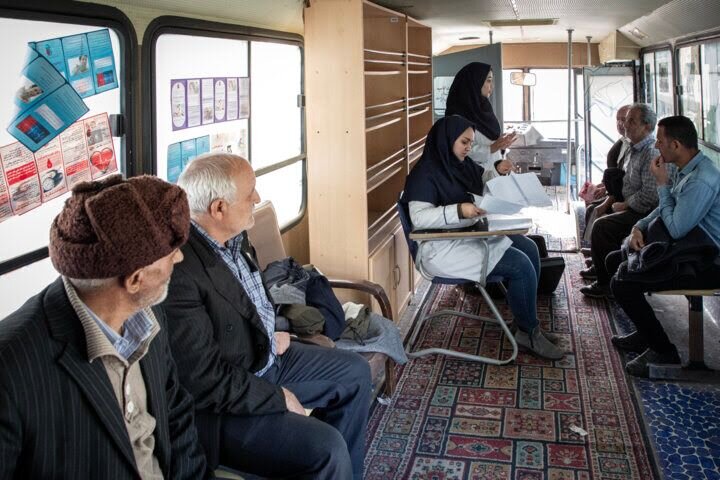Third phase of national health campaign on agenda

TEHRAN – Health Minister Bahram Einollahi has said the implementation of the national health campaign for the population under 18 years of age is on the agenda.
“It is necessary to improve healthcare for the prevention of diseases by conducting nationwide screenings through the early diagnosis of illnesses,” Mehr news agency quoted Einollahi as saying.
“Currently, the majority of the country's population lives in urban areas. Besides strengthening health services and infrastructure, the family physician program has to be followed up seriously,” he added.
Emphasizing the importance of paying attention to children's health as the nation’s future assets, Einollahi called for the implementation of a nationwide screening for those under 18 years old regarding prevalent diseases as well as risk factors and main causes of health problems.
The first phase of the campaign started in November 2023 aiming to reduce deaths caused by non-communicable diseases.
The second phase of the national campaign on promoting a healthy diet focusing on the benefits of iodized salt and dairy products will commence nationwide in the next Iranian calendar month starting January 21.
The third phase of the campaign will prioritize oral and dental health, communicable and non-communicable diseases. It will also focus on training and promoting health, mental health, workplace health, and improving nutrition for the population under 18 years of age.
Second phase of national campaign
Since diabetes and high blood pressure, as the main causes of non-communicable diseases are directly affected by one’s diet, the second phase of the national health campaign focuses on healthy diets.
Part of the campaign will provide nutritional counseling to patients identified in the national health campaign with (probable) diabetes and high blood pressure, and the other part focuses on training a healthy diet, such as avoiding the consumption of fatty, salty, sweet, and fast.
Salt is the subject of the first week of the campaign, from January 21 to 27, with the theme of ‘Everyone’s choice: little but refined iodized salt’.
Dairy is the subject and theme of the second week, from January 28 to February 4, with the theme of ‘From childhood to old age, consume healthy dairy products.’
Over 44m people take part
More than 44 million people have so far taken part in the national health campaign aiming to be screened for high blood pressure and diabetes.
Out of the screened people, 10 million were identified with probable hypertension, and 3 million were identified with probable diabetes.
Nearly one million with hypertension and 400,000 with diabetes were unaware of their conditions/ diseases.
The first phase of the national health campaign started in November 2023 aiming to reduce deaths caused by non-communicable diseases.
The project with the theme of "earlier awareness, better care" will go on until January 20, ISNA reported.
The main objective of the campaign is to provide free health care for diabetic and hypertensive patients in the framework of the family physician program and to create an electronic health file for patients.
The identified patients will be checked every month or every three months by healthcare workers and doctors to receive free tests and medicines if needed.
Nowadays, health is one of the most essential human needs. Before the coronavirus pandemic, people may not have realized its importance, but this disease showed us how precious health is, Health Minister Bahram Einollahi said at a ceremony to unveil the Campaign.
“Maybe everyone thinks that our job is treatment, but it is not true. Our main duty is to prevent diseases and promote health.”
For this reason, a project called "national health campaign” started on November 11, 2023, and will continue till January 20.
Emphasizing the importance of improving health literacy, Einollahi said, “The level of literacy in the society has increased, and we expect this level to improve in the field of health as well. Also, we hope to manage having an electronic health file for every Iranian with their national identification code to record the history of illnesses in their family, their lifestyle, etc. so that their diseases and their reasons can be traced easily.”
He emphasized the campaign should include over 70 percent of the country's population; there is full preparation for its implementation in all universities of medical sciences, and everyone is mobilized to implement the plan.
Talking about the national health campaign, Einollahi said the campaign focuses on providing electronic health records for each family and screening them for diabetes and hypertension, and 70 percent of people are expected to participate in the campaign.
Einollahi added: “About 83 percent of all deaths registered in hospitals are caused by non-communicable diseases. Around 300,000 people die from cardiovascular diseases every year. Some 32 percent of people over 18 years old have hypertension, and 60 percent are unaware of their high blood pressure. Some 30,000 deaths per year occur due to diabetes in the country, which are all significant cases.”
By implementing the national health campaign, half a million deaths from non-communicable diseases and 30,000 deaths from diabetes can be prevented, he added.
MT/MG
